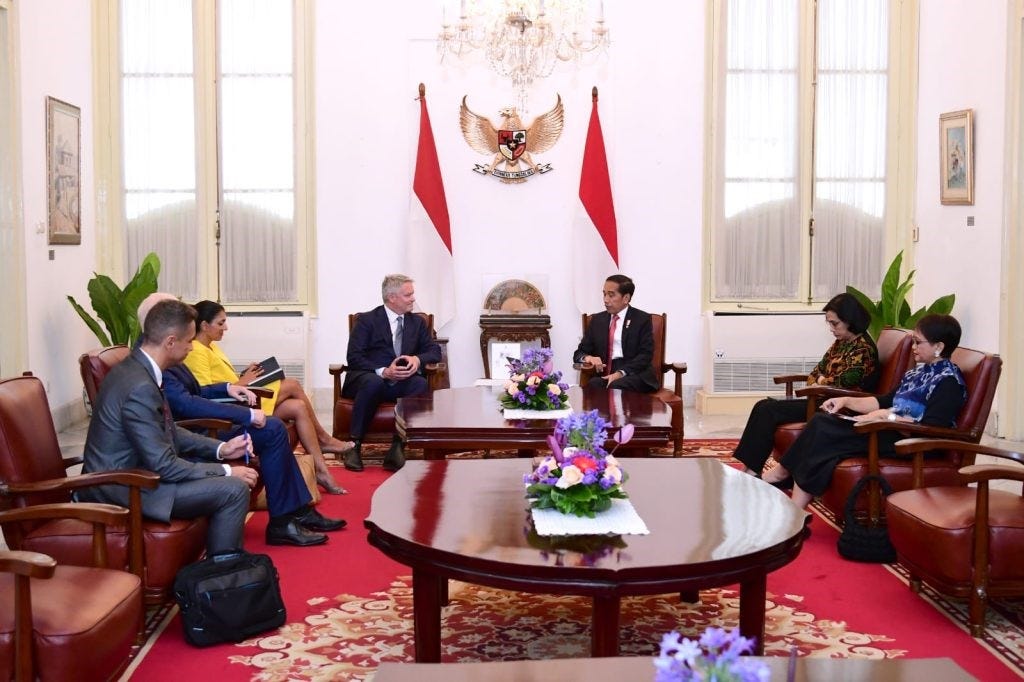Indonesia’s Big New Bid Moves Closer with OECD Green Light
Plus new "deepest" historic deal talk; first regional advanced 5G test hype; biggest defense airshow returns; world's largest coming wealth surge & much more.
Greetings to new readers and welcome all to the latest edition of the weekly ASEAN Wonk BulletBrief! If you haven’t already, you can upgrade to a paid subscription for $5 a month/$50 a year below to receive full posts by inserting your email address and then selecting an annual or monthly option. You can visit this page for more on pricing for institutions, groups as well as discounts.
For this iteration of ASEAN Wonk BulletBrief, we are looking at:
Assessing the geopolitical and geoeconomic significance of progress on Indonesia’s big new international bid;
Mapping of regional developments including new “deepest” historic deal talk; a “Monster” South China Sea return and a notable destroyer port call;
Charting evolving geopolitical, geoeconomic and security trends such as on the geopolitics of trade pact expansion; the shifting media regulation landscape and the world's largest coming wealth surge;
Tracking and analysis of industry developments and quantitative indicators including a new first in advanced 5G testing; future nuclear energy prospects; record foreign investment flows chatter & more;
And much more! ICYMI, check out our wide-ranging interview with a former deputy trade minister and current government advisor on the geopolitics and geoeconomics of Malaysia-Singapore cross-border collaboration. This is the second in our series, following one with a former U.S. ambassador to Indonesia on the country’s future foreign policy prospects, which we also assessed here. ASEAN Wonk also joined the Global Dispatches podcast to discuss what Indonesia’s election results may mean for the country’s global outlook.
WonkCount: 1,829 words (~9 minutes reading time)
New “Deepest” Defense Pact Talk; Monster South China Sea Return & More

Supercharging Energy Partnerships; The Geopolitics of Trade Pact Expansion & “Live and Let Live” Conflict Management Approach
“[T]here are significant challenges to scaling JETPs as they are currently structured,” argues a new report by the Rockefeller Foundation and the Environmental Defense Fund on the Just Energy Transition Partnerships which have thus far been set up with both Indonesia and Vietnam. The report suggests several recommendations, including a pilot project in the Philippines as well as a scaled support package for Thailand and other interested nations (link).
Map of Current Just Energy Transition Partnerships
“[J]ustifications for delay in processing additional membership requests are wearing thin,“ warns a new publication from the Asia Pacific Foundation of Canada on managing membership accession in the Comprehensive and Progressive Agreement for Trans-Pacific Partnership (CPTPP) that involves four Southeast Asian states — Brunei, Malaysia, Singapore and Vietnam. The CPTPP’s current accession issues include China’s pending application to a previously U.S.-led pact before Washington’s withdrawal in 2017. The publication recommends the formation of a dialogue group for all aspirant members to limit the resources needed to conclude talks and shorten the time needed to get expansion underway (link).
CPTPP Original Membership Relative to RCEP and IPEF
The next Indonesian president “should refrain from announcing the kind of grandiose goals for Papua that marked the Jokowi administration,” suggests a new report by the Institute for Policy Analysis of Conflict based in Indonesia. Instead, the report suggests a “live-and-let-live” approach that aims for basic goals like better protection of civilians and reduction of violence to buy time and build trust, a model that is at play in Lanny Jaya district where violence has steadily declined (link).
Map of Insurgency-Related Violence Expansion in Papua
Indonesia’s Big New Bid Moves Closer with OECD Green Light
What’s Behind It
The Organization for Economic Cooperation and Development (OECD) announced a historic decision to open accession talks with Indonesia. The announcement was made by the OECD on February 201. This came just a few days after preliminary results released on Indonesia’s February 14 presidential election suggested that Prabowo Subianto would likely be the next president of the world’s fourth-largest country and third-biggest democracy.
Select Key Recent Developments in Indonesia’s Engagement with Regional and Global Institutions
The announcement is the latest spotlight on Indonesia’s engagement with regional and international institutions and vice versa. Over just the past few months alone (see graphic above), we have seen several developments in this space as noted previously on ASEAN Wonk, including Indonesia’s decision to not join the BRICS in the last expansion wave; its chairmanship of ASEAN in 2023 as well as its response to the Israel-Gaza war across engagement with institutions such as the Gulf Cooperation Council and the International Court of Justice. This is also part of the OECD’s increasing engagement with Indonesia and Southeast Asia more generally. Though the grouping committed to enhanced engagement in the 2000s, progress has accelerated in recent years, including through a first ASEAN MoU in 2022 and a strategic framework for the Indo-Pacific last year2. In Southeast Asia, the OECD engagement includes one Key Partner (Indonesia); one Country Program (Thailand) and two MoUs (Singapore and Vietnam).
Why It Matters
The announcement marks another incremental step forward in Indonesia’s OECD bid, which is the first from Southeast Asia. Indonesia has been a OECD key partner country since 2007. But the opening of accession discussions this month means formal engagement in talks around potential eventual membership as well as greater scrutiny around key cooperation pillars, priorities as well as activities (see snapshot table below)3.












